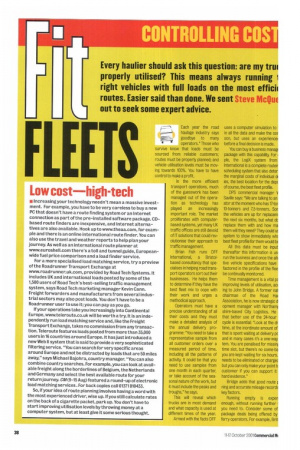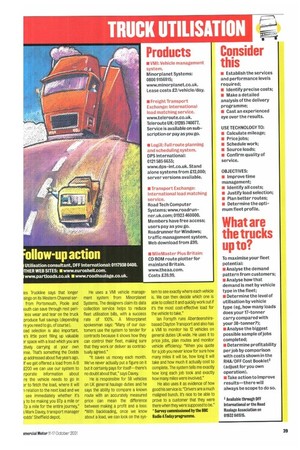FLEE
Page 38

Page 39

If you've noticed an error in this article please click here to report it so we can fix it.
Every haulier should ask this question: are my trul properly utilised? This means always running 1 right vehicles with full loads on the most effich routes. Easier said than done. We sent Steve McQuE out to seek some expert advice.
Each year the road haulage industry says goodbye to many operators. Those who survive know that loads must be sourced from reliable customers; routes must be properly planned; and vehicle utilisation levels must be moving towards 100%. You have to have control to make a profit.
In the more efficient transport operations, much of the guesswork has been managed out of the operation as technology has played an increasingly important role. The market proliferates with computerbased systems, yet many UK traffic offices are still devoid of IT solutions that could revolutionise their approach to traffic management.
Brian Fish runs DFF International, a Bristolbased consultancy that specialises in helping road transport operators sort out their businesses. He helps them to determine if they have the best fleet mix to cope with their work and urges a methodical approach.
Operators must have a precise understanding of all their costs and they must make a detailed analysis of the annual delivery programme: "You need to take a representative sample from all customer orders over a measured period of time, including all the patterns of activity. It could be that you need to use samples from one month in each quarter, or take account of the seasonal nature of the work, but it must include the peaks and troughs," he says.
This will reveal which trucks are in most demand and what capacity is used at different times of the year.
Armed with the facts DFF
uses a computer simulation to in all the data and make the nor son, but uses an experience( before a final decision is made.
You can buy a business manag( package with this capability. For pie, the LogiX system from International is a complete routeir scheduling system that also deter the marginal costs of individual ch ies, the best location for the depc of course, the best fleet profile.
DPS commercial manager V Saville says: "We are talking to an ator at the moment who has 17-tor 10-tonners and 7.5-tonners. Sor the vehicles are up for replacem the next six months, but what dc replace them with and how ma them will they need? They could uE system to show immediately whE best fleet profile for them would b( All this data must be input thereafter this information is usi run the business and once the alt tive vehicle specifications have factored in the profile of the flee be continually monitored.
Time management is a vital p( improving levels of utilisation, aci ing to John Bridge. A farmer na chairman of the Road Ha Association, he is now strategic c opment manager with Northam shire-based City Logistics. He that better use of the 24-hour cycle is essential: "Look at the d time, at the inordinate amount of that is spent waiting at delivery pi and in many cases it's a one-way tem. You are penalised for missiri time slot, but there's no come-ba you are kept waiting for six hours needs to be eliminated or charge but you can only make your point lc customer if you can support it hard evidence."
Bridge adds that good route ning and accurate mileage records key factors.
Running empty is exper enough, without running further you need to. Consider some of package deals being offered by ferry operators. For example, Brit
ies Truckline says that longer sings on its Western Channel serfrom Portsmouth, Poole and louth can save through rest periless wear and tear on the truck produce fuel savings (depending re you need to go, of course).
oad selection is also important. ‘es little point filling up valuable ?.r space with a load which you are 3tively carrying at your own mse. That's something the Dodds Jp addressed about five years ago. If we get offered a load from A-B £200 we can use our system to irporate information about re the vehicle needs to go in ?.r to fetch the load, where it will n relation to the next load and we see immediately whether it's y to be making you 87p a mile or 7p a mile for the entire journey," 3 Mark Davey, transport manager odds Sheffield depot.
He uses a VMI vehicle management system from Minorplanet Systems. The designers claim its data collection service helps to reduce fleet utilisation bills, with a success rate of 100%. A Minorplanet spokesman says: "Many of our customers use the system to tender for contracts because it shows how they can control their fleet, making sure that they work or deliver as contractually agreed."
"It saves us money each month. We've never actually put a figure on it but it certainly pays for itself—there's no doubt about that," says Davey.
He is responsible for 58 vehicles on UK general haulage duties and he says the ability to compare a known route with an accurately measured price can mean the difference between making a profit and a loss: "With backloading, once we know about a load, we can look on the sys tem to see exactly where each vehicle is. We can then decide which one is able to collect it and quickly work out if it's the most cost-effective load for the vehicle to take."
Ian Forsyth runs Aberdeenshirebased Clayton Transport and also has a VMI to monitor his 12 vehicles on general duties UK-wide. He uses it to price jobs, plan routes and monitor vehicle efficiency: 'When you quote for a job you never know for sure how many miles it will be, how long it will take and how much it actually cost to complete. The system tells me exactly how long each job took and exactly how many miles were involved."
He also uses it as evidence of how good his service is: "Drivers are a much maligned bunch. ft's nice to be able to prove to a customer that they were there when they were supposed to be."
• Survey commissioned by the BBC Radio 4 Today programme.








































































































































